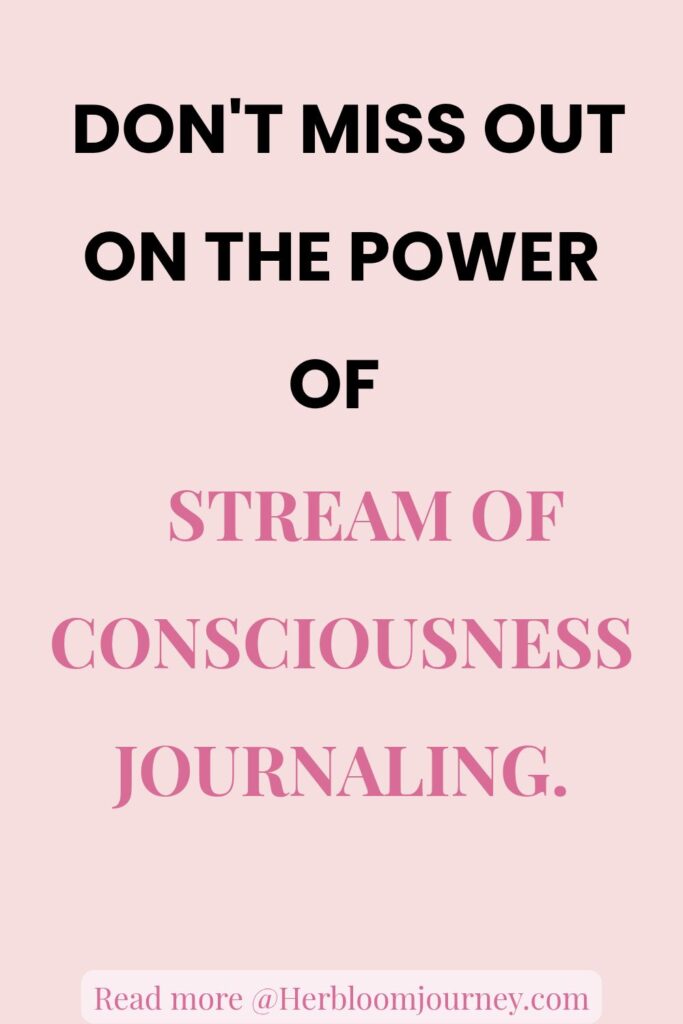
Journaling can often feel rigid, constrained, and almost too perfect. However, stream-of-consciousness journaling defies all these rules.
When was the last time you picked up a pen and let your thoughts flow freely to the page without worrying about structure, grammar, or handwriting?
When was the last time you did journaling without prompts?
Stick around to find out how to do stream-of-consciousness journaling and the mental and emotional benefits behind this journaling technique but before that…
Table of Contents
Stream of consciousness journaling definition.
What exactly do we mean when we say stream-of-consciousness journaling?
Picture a river flowing, its waters rippling forth from an abundant source; stream consciousness journaling is letting your thoughts flow effortlessly without worrying about coherency, Grammar, or anything else really.
It’s a realization of your thoughts and letting the pen do your bidding without worrying about the perfect words.
I like to think of it as intuitive Journaling, and as women, we hold so many thoughts in our heads that we need to unburden.

Why you should consider journaling without prompts.
Alright, I won’t lie. I am a sucker for some deep journaling prompts; it’s good to be led. However, I adore free-flow journaling.
Journaling without prompts is so raw, unadulterated, and revealing.
It’s my go-to choice when I am stressed, playful, or anxious.
Here are a few reasons why you should also give it a go:
- Creative freedom: for all you might not know, there may be a dormant poet in you. Shall we find out?
- Emotional clarity.
- A connection with your intuition: when you journal, you give your inner voice a chance to regale its wisdom.
- Mental decluttering of all those thoughts.
The emotional and mental benefits of free-flow journaling.
Stream-of-consciousness journaling unlocks multiple benefits for you; let me convince you.
Mental benefits of stream-of-consciousness journaling.
- Journaling has been scientifically proven to reduce stress and anxiety.
- Helps to control overthinking.
- Unlocks your creativity and ushers fresh ideas.
- Improves focus and mental clarity.
Emotional benefits of stream-of-consciousness journaling.
- Helps you to process complicated emotions.
- Builds an awareness of said emotions.
- Emotional release.
Spiritual benefits of stream-of-consciousness journaling.
- Develops your intuition.
- Access to information that your higher self possesses.

A step-by-step on how to start stream-of-consciousness journaling.
Are you ready to hold space for your true thoughts and emotions? Great here’s how you begin free-flow journaling.
1. pick up your supplies.
Pick a journal and some cute pens for your Journaling journey. I like to call it a hobby, and it begins here.
And babe, I don’t encourage consumerism, especially that of stationery; there are so many cute journals out there, so be mindful.
2. Ready your space.
Where do you intend to journal? Your couch, or desk? Make your pick.
What else do you intend to include in your Journaling space?
You can choose to enhance your space with candles, a throw blanket, or wearing soft pj’s or a cup of steaming coffee.
3. Set an intention.
You’re ready to start journaling; however, let’s set an intention. It could be something like, “I allow myself to feel safe in this space where I express my thoughts and emotions.”
4. Let the pen flow without inhibition.
Begin writing that which comes to your mind; let your intuition take the lead.
5. peruse your words without judgment.
Afterward, you can go through your journal entry and analyze your state of emotions or thoughts and also take note of how you feel after journaling.
An example of a stream-of-consciousness journal entry from my diary.
Here’s a raw and unfiltered stream-of-consciousness journal entry that I wrote in my journal folder on Google Docs:
“February 22nd.
Can I tell you something crazy? I am actually starting to believe in the power of the universe and everything working out for me.
I am more mindful of what I consume.
I believe in manifestation and energy. I am learning a lot.
It’s a little puzzling but I love it.
And yes, I still very much do believe in God but I will no longer attach a gender to the creator because I don’t believe that the supreme God has one.
Anyway, I love it here.
But one thing that I want to focus on is being a better mum.
I want to be more patient, understanding, and selective with my language.”
Things you can write about in your stream-of-consciousness entries without any journaling prompts.
They’re stream-of-consciousness prompts that can help you get started; I will list them at the end.; however, the question is, what do you write about when you’re only relying on your intuition?
1. Emotional state.
Are you going through something and you really need to process your emotions? Journal.
2. Self-awareness.
Are you feeling a little lost on who you are and the way forward? You know it, journal.
3. career.
How’s your career ladder looking, any wins?
4. Relationships.
What is the state of your relationships?
5. Hobbies.
Are you looking for a purpose outside of your current reality?
Journaling has been scientifically proven to reduce stress and anxiety.
Common challenges you might face in free-flow journaling.
Like everything else in life, this form of journaling also has its challenges. Here are a few common ones.
1. feeling silly.
The first time I did a stream-of-consciousness journal entry, I felt silly. I didn’t even know who to address, how to talk or rather write, or which tense to use.
Over time, I realized that I couldn’t have a better buddy to talk to because there were no rules.
It’s okay to feel silly. At first,, you will get past it.
2. My mind feels blank.
F you’re the kind of woman who prefers structure and you set aside time to journal, it’s possible to feel empty or blank.
Like what do I write about now?
My advice is that you can never be too boring or basic for your journal entries. This is acceptable: “Today I ate a tangerine. It was actually very tangy.” Close.
3. Feeling self-conscious.
The last thing we want is for you to feel embarrassed of the things that you see and want to say, but truth be told, it happens.
So I want you to remind yourself that it’s a safe space, you’re totally human, and one will read your entry.
4. How often do you practice it?
If you’re the sort of woman who likes structure, set an intention of how many times you wish to journal in a week, like each morning or once a week, however…
If you’re spontaneous like me, journal whenever you feel the excitement or need to.

Bonus, stream-of-consciousness journaling prompts.
- How do I feel right now, emotionally, physically, and energetically?
- What am I holding onto today?
- What am I afraid to admit to myself?
- What do I wish someone would say to me?
- What patterns do I notice in my thoughts lately?
- What do I long for?
- What’s something I’m pretending not to care about?
- Where in my life do I feel free? Where do I feel trapped?
- If I could change something at this very instant what would it be?
Final thoughts.
Finally, I hope that you’re now ready to practice stream-of-consciousness journaling, journal without prompts, and, most importantly, let your intuition guide you.
There are plenty of benefits, such as stress relief, awaiting on the other side if you’re bold enough to pick your pen and paper.
Remember to let go of all imperfections and trust the process; two years from now, you will be reading your entries and smiling at all those versions of yourself.
Let me know in the comments whether you prefer free-flow journaling or using journaling prompts?





